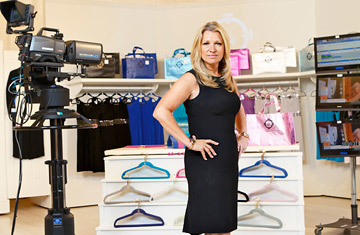
Mindy Grossman at one of HSN's studios
Daniel Kiviat is a courteous and fastidious gentleman who designs clothing for the so-called forgotten woman. His specialty is comfortable garments, immune to the tastes of the day, that in his words "cover you everywhere you want to be covered." They're exactly the kind of ensembles one might expect to find on a home-shopping network. That was why Kiviat was one of the first people fired when Mindy Grossman took over HSN.
Grossman, now 55, became CEO of the TV station cum mall in 2006. She was the eighth boss in 10 years and--despite the fact that the home-shopping customer base is 80% female--the first woman. In the past six years, HSN has grown from a dowdy backwater that hawked items of questionable utility and origin to a vibrant online destination with enough juice to demand that manufacturers make products in colors exclusively for its customers.
With sales of about $2.2 billion last year, HSN is not the juggernaut that Amazon and eBay are. It's not even a third as big as rival QVC. But its share price has trebled since it went public four years ago and has risen almost 40% in the past year. Its customer base is highly engaged, with the most loyal ordering 36 times a year. Unlike other online shopping portals, it has video. If retail's holy grail is to make online shopping more communal--to harness the power of friendship in the cause of commerce--HSN is in a sweet spot.
When Grossman took over, Kiviat's line, named Maggie Sweet, was the channel's biggest apparel seller, moving more than $22 million worth of garments in his last year on the air. Then again, it didn't have that much competition. A brand on HSN was in the reality-show phase of its prestige arc. The network had one bona fide celebrity pitchman (the ubiquitous Wolfgang Puck) and a reputation for cutting a swath through the credit cards of lonely shut-ins and hoarders. The place was making money, but it wasn't making customers.
Six years later, the airwaves out of the St. Petersburg, Fla., studios of HSN are saturated with big names, from J. Lo to Serena Williams, from Randy Jackson to Emeril. It's not just celebrities: British vacuum manufacturer Dyson, the Museum of Modern Art's Design Store and fashion labels Badgley Mischka and DKNY have all been bitten by the HSN bug. In March, Lionel Richie held a miniconcert at HSN's studios to kick off Tuskegee, his first chart-topping album in more than 25 years. Oscar-winning costume designer Colleen Atwood launched her first clothing line there. HSN still sells weird items--Kathy Najimy's line of Ch'Arms, tops that cover your arms but not your chest, springs to mind--but they are the exception rather than the norm. (Perhaps in response, QVC has gotten into the celeb business too. Its most recent recruit is Jennifer Hudson.)
How did a first-time CEO with no experience in television or direct-to-consumer retailing turn HSN around? It was pretty simple, really. She just got everybody to think in a whole new way.
